
When you pick a streetwear manufacturer, you work with a team that acts fast and fixes problems before they stop you. You get your products out quickly because these partners know how to meet short deadlines. You skip the extra costs and slowdowns that happen with regular suppliers. With a streetwear manufacturer, you get good quality, custom choices, and a partner who understands what your brand needs.
Pick a streetwear manufacturer for fast making and help with problems. Work with manufacturers who know streetwear to keep up with trends. Use social media to try new styles and see what people like before making a lot. Choose good materials so your clothes feel nice and last long. Use custom branding to help your products get noticed. Try fast prototyping to see your designs soon and change them if needed. Make a long-term partnership with your manufacturer for help and chances to grow. Look at eco-friendly choices to attract people who care about the environment.
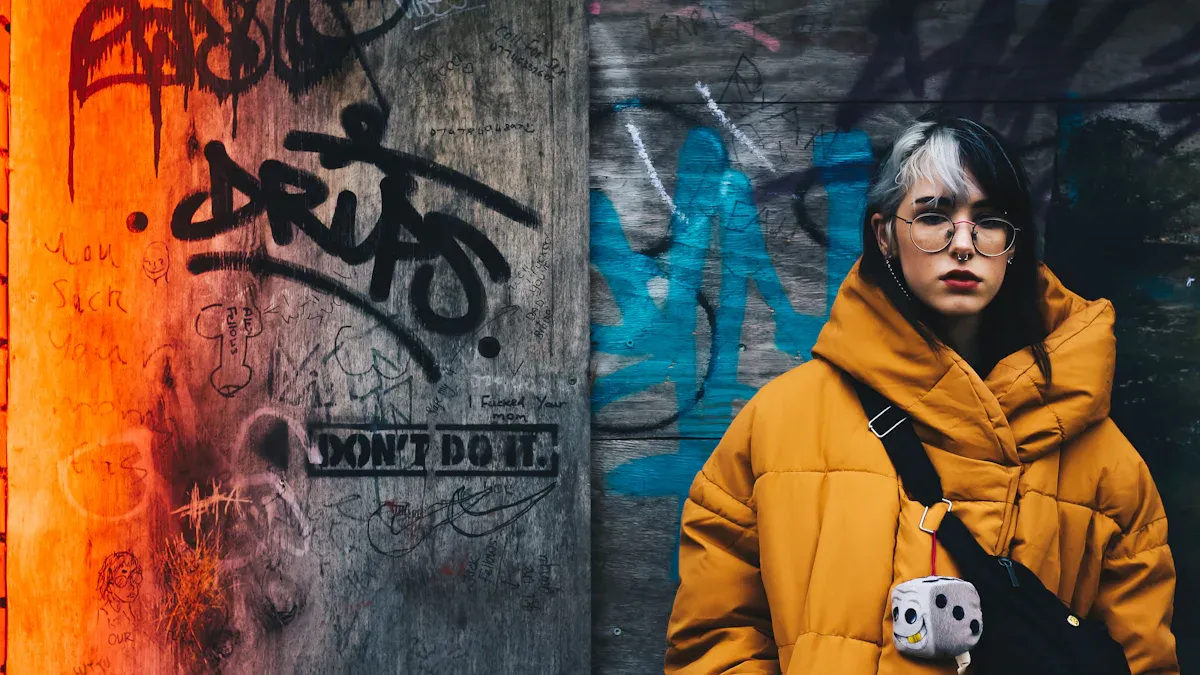
When you work with a streetwear manufacturer, you tap into a world where style changes fast. These experts know what looks cool right now. They pay attention to bold graphics, unique color mixes, and the latest fits. You see this in brands like Bomme Studio and AEL Apparel. They always seem to know what’s next, whether it’s oversized hoodies or eye-catching prints.
Here’s a quick look at how streetwear manufacturers understand trends better than regular clothing makers:
Evidence | Explanation |
|---|---|
Streetwear has subverted the traditional fashion model | Streetwear manufacturers engage directly with consumers, allowing them to influence trends rather than relying solely on industry insiders. |
This shows that streetwear brands pay close attention to what people say online. | |
65% of consumers trust musicians over influencers | Streetwear brands connect with music and culture, making their styles more relatable. |
70% of consumers value social awareness | These brands care about what matters to you, like social causes and community. |
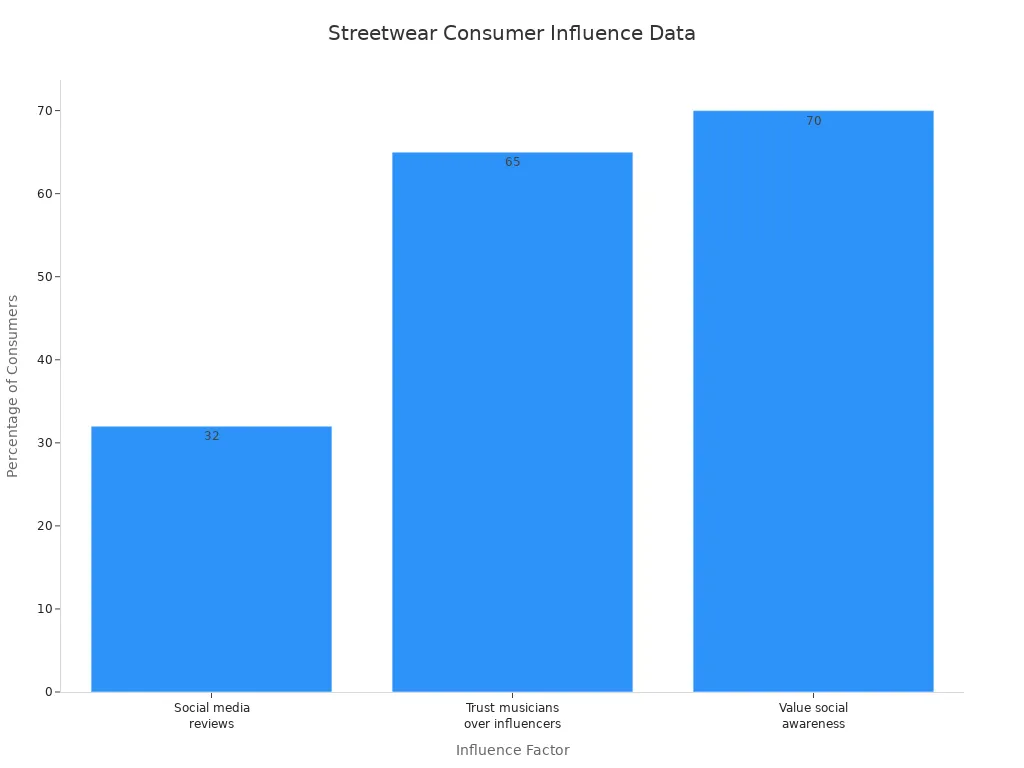
You want your brand to stand out. A streetwear manufacturer helps you do that because they stay close to what people want. They watch social media, listen to music trends, and follow what’s happening in pop culture. They also care about things like social awareness, which matters to many buyers today.
They keep up with cultural influences.
They use online tools to see what’s trending.
They team up with artists and other brands.
They bring streetwear into the mainstream, so your line feels fresh.
You need to know if your ideas will sell. Streetwear manufacturers use smart ways to test new styles. They might start with small batches to see if people like them. They check social media for feedback and watch how fast items sell out. This helps you avoid making too much of something that might not be popular.
They estimate how many people want your product.
They use social media to see what gets people excited.
They test the market with limited runs to create hype and keep things exclusive.
Turning a trend into a real product takes skill. Here’s how a streetwear manufacturer does it:
They collect data from social media and surveys.
They clean up the data to make sure it’s accurate.
They use special tools to spot new trends.
They predict how much people will want a new style.
They plan production so you get your products on time.
They keep checking sales and feedback to adjust quickly.
They think about sustainability, so your brand stays responsible.
Tip: When you choose a streetwear manufacturer, you get a partner who knows how to turn what’s hot right now into something your customers will love tomorrow.
You want your clothes to feel nice and last long. A streetwear manufacturer gives you great materials for your line. You can pick soft cotton for hoodies, warm fleece for sweatshirts, or strong denim for jackets. These materials do more than look good. They help your clothes stay cool, comfy, and tough.
Here’s a quick look at the most common materials used in streetwear:
Material | Characteristics | Common Uses |
|---|---|---|
Cotton | Soft, breathable, and versatile; keeps cool and comfortable. | Hoodies, T-shirts, joggers |
Fleece | Warm and soft; ideal for layering and cold weather. | Sweatshirts, tracksuits |
Denim | Strong and stylish; associated with authenticity. | Jackets, jeans, accessories |
Nylon | Lightweight and weather-resistant; suitable for active wear. | Windbreakers, bags, hats |
Polyester | Durable and breathable; often used in performance wear. | Activewear, outerwear |
Twill | Structured and high-quality look; suitable for dressier styles. | Cargo pants, jackets |
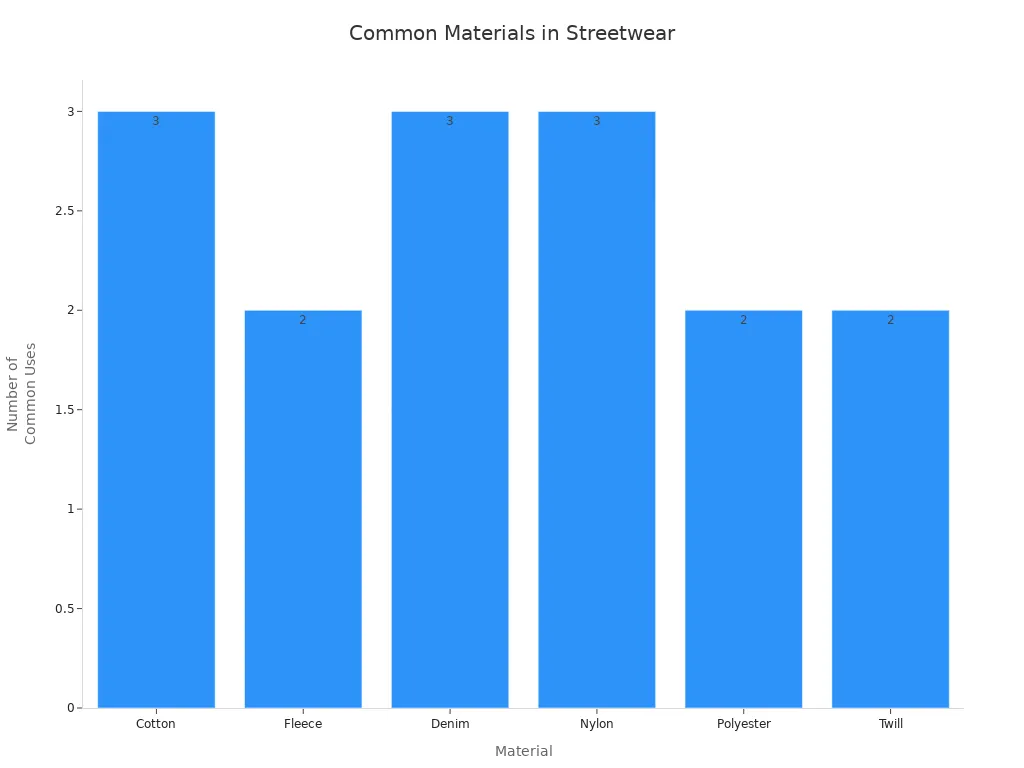
You get more than just fabric. Many streetwear manufacturers use recycled and biodegradable materials now. They help you make a brand that cares about the planet. You can ask for tips to make your line greener. This matters to buyers who want eco-friendly choices.
You want your designs to stand out. Streetwear manufacturers offer cool printing and embroidery techniques. You can get bright graphics, custom patches, or detailed logos. These techniques make your clothes special and help your brand get noticed.
Screen printing gives you bold colors and sharp lines.
Embroidery adds texture and a fancy look.
You can mix printing and embroidery for a layered style.
Some manufacturers, like Hangzhou Aiqi Clothing, let you pick the style you want. You can choose the fabric, color, size, and type of print or embroidery. They make samples from your ideas, so you see them before you order more.
You want your brand name on every item. A streetwear manufacturer helps with private label services. You can add your own tags, labels, and logos. This makes your line look pro and helps people remember your brand.
You get full control over how your products look and feel. You work with experts who help you from design to delivery.
You want your products to arrive looking cool. Streetwear manufacturers offer custom packaging choices. You can pick eco-friendly boxes, branded bags, or special wrapping. This makes your line better and gives buyers a great first impression.
Tip: Custom packaging helps your brand stand out and shows you care about every detail.
You get more than just clothes. Top streetwear manufacturers, like Hangzhou Aiqi Clothing, offer OEM services. This means you can make garments from scratch, pick your own fabrics, and add special extras. You can visit the factory to see how things are made. You get samples to check quality before you order more.
Here’s what you can expect:
Feature | Description |
|---|---|
Customization | Accepts custom designs and makes garments from scratch. |
Sample Creation | Creates samples based on client specifications. |
Fabric and Accessories | Offers a wide selection of fabrics and accessories. |
Sustainability Advice | Provides guidance on making apparel more sustainable. |
Factory Visits | Allows clients to visit factories to observe product development. |
Timely Delivery | Commits to on-time delivery and expedited production if necessary. |
Communication | Ensures effective communication to understand client needs. |
Minimum Order Quantity (MOQ) | 100 pieces per design per color; 500 pieces for special fabrics. |
Customization Options | Includes options for fabric, color, size, printing, and embroidery. |
Quality Assurance | Guarantees quality with strict quality checks for all products. |
Competitive Pricing | Offers advantages in pricing and delivery time. |
You get fast answers and clear updates. You know when your products will arrive. You can order small batches or big ones, depending on your needs.
Note: Many streetwear manufacturers now use made-to-order production. This helps cut down waste and keeps your brand eco-friendly. You can pick green packaging and trims to show you care about the environment.
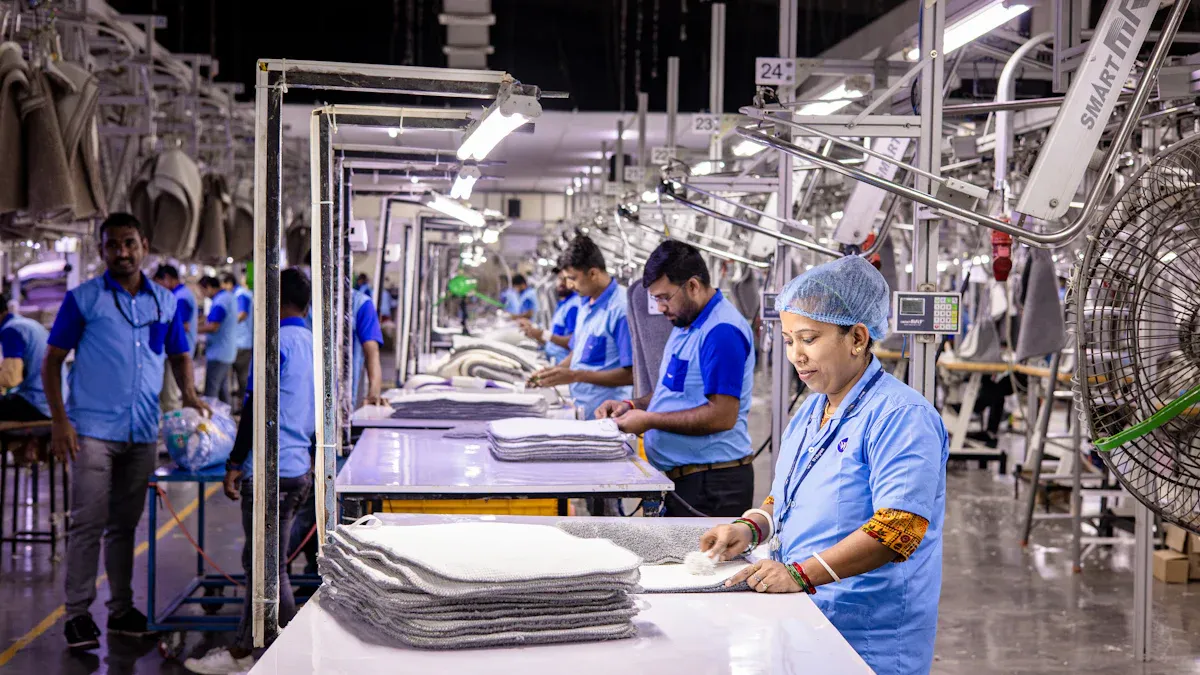
You want to see your ideas come to life quickly. Streetwear manufacturers make this happen with fast sample production. Skilled sample makers work on your designs and use advanced tools like Product Lifecycle Management (PLM) software. This helps everyone stay on the same page and cuts down on mistakes. You get your first samples in just 1–2 weeks, so you can check the fit, style, and details before moving forward.
You get rapid prototyping in 1–2 weeks.
Bulk production wraps up in 2–5 weeks.
If you compare this to traditional methods, you’ll notice a big difference. Some manufacturers use 3D technology, which can create prototypes in just a few hours. This means you don’t have to wait long to see your vision in real life.
Method | Time Required |
|---|---|
Traditional methods | 2 to 3 weeks |
3D technology | A few hours |
Tip: Quick samples help you test new ideas and make changes before you invest in a big order.
You might want to tweak your designs after seeing the first sample. Streetwear manufacturers make it easy to adjust colors, fabrics, or graphics. You can ask for changes and get updated samples fast. This back-and-forth process helps you perfect your line without wasting time or money.
You work with experienced engineers and account managers from the start.
Early checks catch problems before they get expensive.
You get feedback and updates at every step.
Maybe you want to test your line with a small launch. Streetwear manufacturers offer flexible options for small batches. You can order as few as 50–100 pieces per color. Sampling takes about 7–10 days, and bulk orders finish in 15–25 days. This lets you try new styles, see what sells, and avoid overstock.
Production Type | Quantity Range | Timeframe for Sampling | Timeframe for Bulk |
|---|---|---|---|
Small Batch (Test Launch) | 50–100 pcs per color | 7–10 days | 15–25 days |
Large Run | Scalable to 300,000 pcs/month | N/A | N/A |
Note: Dedicated project managers keep your launch on track and make sure you hit the market window.
If your brand grows, you might need thousands of units. Streetwear manufacturers can handle large runs, scaling up to 300,000 pieces per month. Large-scale production takes longer, especially if you work with overseas factories. Shipping and logistics get more complex, but domestic options often deliver faster.
Large runs mean longer lead times than small batches.
Overseas production takes more time because of shipping.
Domestic manufacturing usually gets your products to you faster.
You get support from start to finish. Project managers and engineers help you avoid surprises and keep quality high. Whether you want a small test or a big launch, streetwear manufacturers make sure you get what you need, when you need it.
You want to know what you pay for. Streetwear manufacturers show prices clearly from the start. You see all costs before you buy. This means no surprises later. Regular clothing makers might look cheaper at first. But you pay extra for design or hidden fees. Full-service streetwear manufacturers offer one-stop solutions. You pay a little more per item. But you control your total cost and avoid surprise charges.
Traditional Clothing Manufacturer | Full Service Clothing Manufacturer | |
|---|---|---|
Cost Structure | Low unit price, but need to bear the hidden costs (design, inventory) | High unit price, but the total cost can be controlled (one-stop service) |
Core Value | Cost control and production efficiency | Resource integration and risk sharing |
You get a partner who helps you stick to your budget. They make things easy for you.
Streetwear manufacturers give you deals for bigger orders. You save money when you buy more. Many offer discounts for large orders. Some even give free shipping if you buy enough. This helps you get more for your money.
Order Size | Discount Rate |
|---|---|
100+ units | 10% off |
500+ units | 15% off |
Orders over $250 | 15% off |
Free Shipping | Over $50 (Ninja Blanks), Over $99 (Blankstyle) |
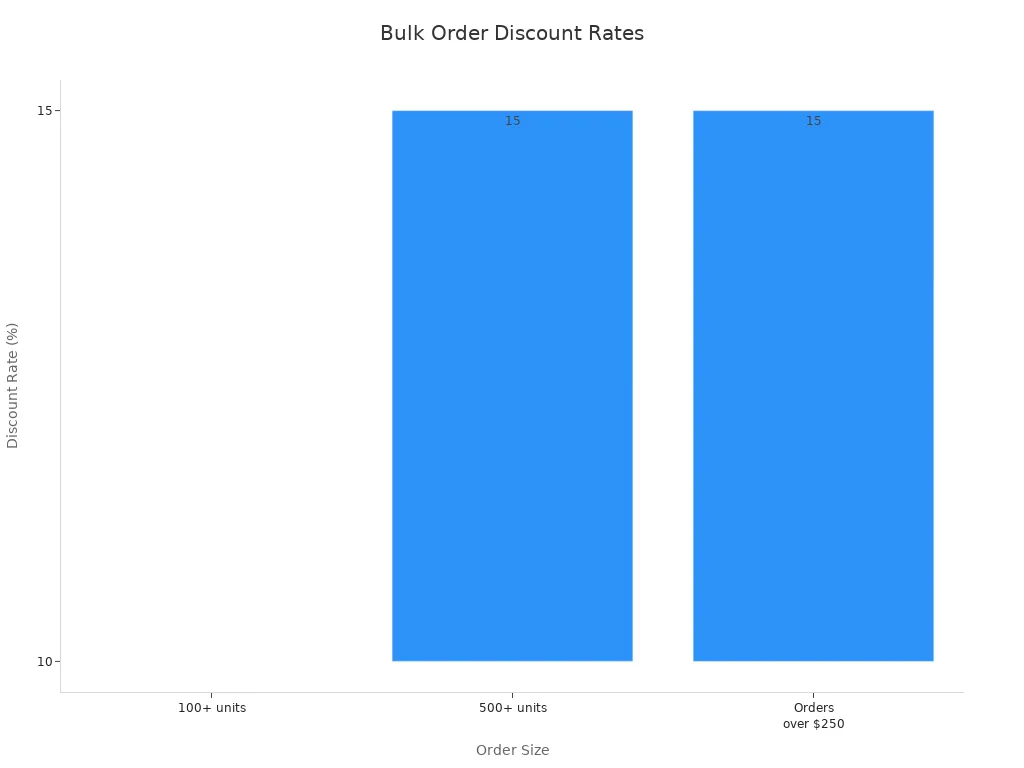
Tip: Ask your manufacturer about bulk discounts and free shipping. You might save more than you think!
You want your products to look good and last long. Streetwear manufacturers set high standards for quality. They check materials and fit at every step. You get fewer mistakes and better results. Here’s how they do it:
They set clear rules for materials and construction.
They inspect fabrics, samples, and finished products.
They collect customer feedback to keep improving.
Many manufacturers follow international standards like ISO 9001 and ISO 14001. This means your products meet safety and environmental rules. You get reliable quality and a brand that cares about the planet.
You need your line to launch on time. Streetwear manufacturers use smart tools to keep projects moving. They show you timelines and dashboards, so you always know what’s happening. They balance creativity with clear choices, so you don’t get stuck. If something goes wrong, they have backup plans ready.
They train teams to know production limits.
They use technology for fast design approvals.
They track goals to stay on schedule.
They make sure everyone knows their job.
Note: Good project management means fewer delays and less stress. You get updates, quick fixes, and a smooth path from idea to finished product.
You also get peace of mind. Verified suppliers and extra services help you avoid mistakes. You focus on your brand while your manufacturer handles the details. That’s real value.
You might feel stuck when you start your streetwear line. A good manufacturer helps you move forward. You get support with every step, from your first sketch to your final product. Many streetwear manufacturers, like ASBX, work with new brands and make the process easy.
Here’s what you can expect when you team up with a streetwear manufacturer:
In-depth research to create custom styles that fit your brand.
Pattern making for the right fit and quality.
Sourcing premium fabrics and trims for comfort and style.
Fittings to make sure your clothes look and feel great.
Sample making so you can see and touch your designs before production.
Transparent pricing so you know what you’re paying for.
Options for full-package or cut-make-trim (CMT) production.
Help with logistics to get your products delivered on time.
Tip: If you’re new to fashion, choose a manufacturer that offers design help and sample making. You’ll avoid costly mistakes and learn as you go.
You don’t need to be an expert in clothing production. Your manufacturer guides you through technical details. They help you pick the right materials, check the fit, and review samples. You get answers to your questions fast. If you run into problems, they help you fix them before your launch.
Here’s a look at how the process works:
Stage | Description |
|---|---|
You share your ideas, and the team turns them into technical plans. | |
Material Sourcing | They help you find quality fabrics and trims. |
Prototyping | You get a sample to check fit and style before making more. |
Sample Approval | You review the sample and give feedback. |
Mass Production | They make your clothes in the quantity you need, keeping quality high. |
Quality Control | Every item gets checked for stitching, branding, and durability. |
Packaging & Shipping | Your products get packed and shipped so they arrive ready for your customers. |
You want your brand to grow and stay true to your vision. Building a long-term partnership with your manufacturer helps you do that. You get access to new markets and retailers. You can work with designers and artists for special collections. You join co-branded campaigns that keep your brand fresh and relevant. Your manufacturer helps you use ethical and sustainable supply chains.
Working with a trusted manufacturer means you deliver quality and keep your brand authentic. You scale up without losing what makes your brand special.
Collaboration with designers and artists
Co-branded marketing campaigns
Sustainable and ethical supply chains
Note: Long-term partnerships help you grow your brand and keep your values strong.
You don’t have to do everything alone. Your manufacturer connects you to a network of suppliers, designers, and production partners. You get faster delivery and lower inventory risk. Marketplace services help you find the right partners and expand your reach.
Benefit | How It Helps You |
|---|---|
Quick delivery and less risk of running out | |
Easier access to new manufacturers and partners | |
Industry links | Support for growth and new opportunities |
Tip: Use your manufacturer’s network to find new ideas, partners, and ways to grow your brand.
You might wonder how new brands break into the streetwear scene. Many start with a streetwear manufacturer and see real results. Let’s look at a few examples:
Brand Name | Description | Team Size | |
|---|---|---|---|
LacedUp | $13.2M/year | Transitioned from a retail store to a successful sneaker resale business. | 40 |
Dropout SRL | $1.68M/year | Created a sneaker shopping experience in Italy after learning about the resale market. | 8 |
Empire Skate | $1.44M/year | Launched a skate and streetwear store to serve the local community after the only shop closed. | 10 |
DEAL WITH DEVIL | $7.8K/year | Started as a personal project for mental health, now working on growth through social media. | 1 |
You see brands like LacedUp and Dropout SRL start small and grow fast. They use streetwear manufacturers to get quality products and launch new ideas. Empire Skate filled a gap in their local market and built a loyal following. DEAL WITH DEVIL began as a personal project and now reaches more people through social media.
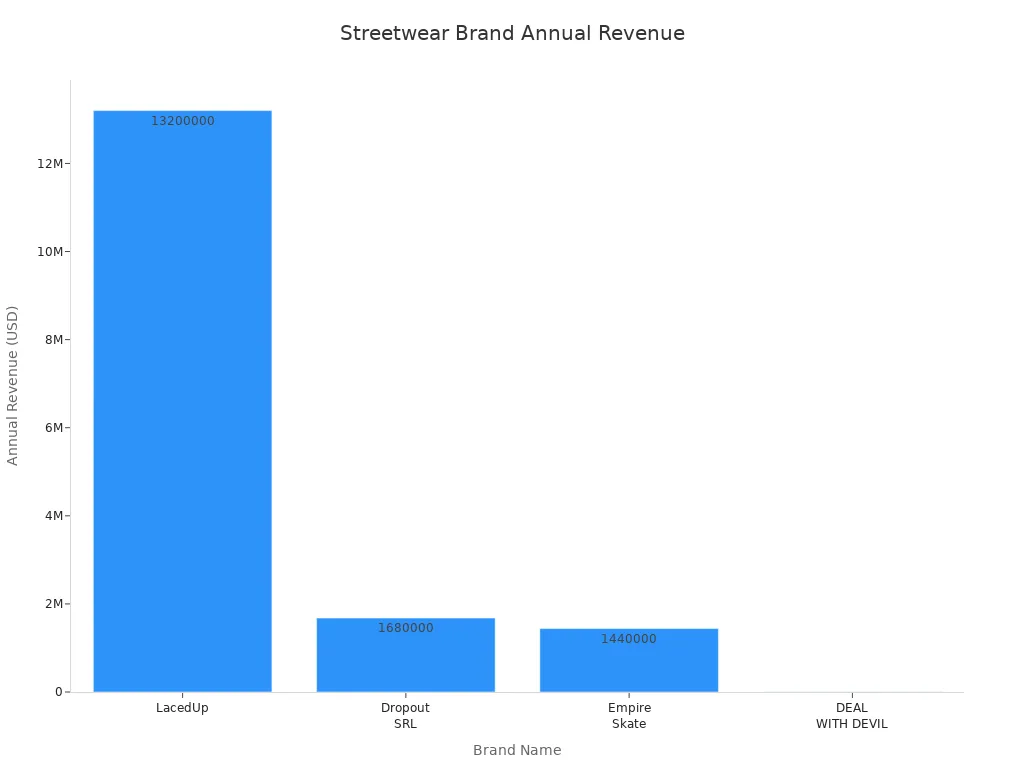
Tip: You can start with a small team and still make a big impact if you choose the right manufacturing partner.
You might already have a brand and want to grow. Many established streetwear brands switch to specialized manufacturers for better results. Here’s what happens when you make the move:
You solve problems with quality control and get products that meet your standards.
You speed up production and launch new styles faster.
You work with a team that understands your creative vision.
You boost your reputation and profits by delivering consistent quality.
You adapt to market changes and try new processes that help you stay ahead.
Switching to a streetwear manufacturer can help you reach new customers and keep your brand fresh.
You can learn a lot from brands that partner with streetwear manufacturers. Here are some key lessons:
Influencer Culture: Champion teamed up with Supreme and used influencer culture to become popular again. You can work with influencers to reach new fans.
Vintage Appeal: New Balance changed its image from a “dad shoe” to a trendy choice for young people. They did this by embracing vintage style and working with streetwear partners.
Note: You don’t need to follow every trend. Focus on what makes your brand unique and use partnerships to build your story.
You see that success comes from smart choices and strong partnerships. Whether you’re launching a new brand or growing an existing one, a streetwear manufacturer can help you reach your goals.
You want your brand to stand out and grow. Streetwear manufacturers help you do that with trend-savvy designs, top-notch quality, and fast production. You save money and avoid mistakes. Check out how big brands benefit:
Brand | What They Get |
|---|---|
Soft, durable, custom-friendly styles | |
Nike | Athletic performance meets street style |
Carhartt | Heavy-duty fabrics for tough wear |
You get quality, speed, and value. Think about how these advantages fit your vision. Ready to take your next step? Your streetwear partner is waiting.
A streetwear manufacturer makes clothes like hoodies, tees, and jackets for streetwear brands. You work with them to create custom designs, pick fabrics, and get your products made.
You share your ideas and designs. The manufacturer helps you choose materials and make samples. You review the samples, give feedback, and then place your order.
Yes! Many streetwear manufacturers let you order small batches. You can test your designs and see what your customers like before making a big order.
You can choose fabrics, colors, prints, embroidery, and labels. Some manufacturers even help with packaging and branding. Your line can look exactly how you want.
Sample making takes about 1–2 weeks. Bulk production can finish in 2–5 weeks. You get updates at every step, so you always know what’s happening.
Many do! You can ask for recycled fabrics, green packaging, and sustainable production methods. This helps your brand care for the planet.
Manufacturers check materials and stitching at every step. You can review samples before production starts. Many follow strict quality standards to make sure your clothes last.
You get support from the manufacturer’s team. They help with design, sizing, and technical questions. You don’t need to be an expert—they guide you through the whole process.